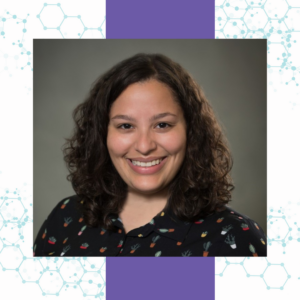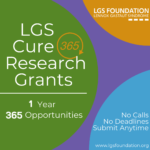2018 Grant Recipient – Kay-Marie Lamar
 Defining the Molecular Mechanisms of CHD2 in LGS
Defining the Molecular Mechanisms of CHD2 in LGS
Kay-Marie Lamar, PhD
Northwestern University
Highlights:
- Dr. Lamar’s work showed that CHD2 has a unique role in human brain development and function. Mutations in this gene can lead to DNA remodeling that then leads to early-onset epileptic encephalopathy, including LGS.
- In 2018, Dr. Lamar published this paper.
- In the summer of 2020, Dr. Lamar was awarded an NIH Ruth L. Kirschstein National Research Service Award Individual Postdoctoral Fellowship to continue her work on CHD2 using 3D cell models.
Results: Pending
Lay Abstract:
Lennox-Gastaut syndrome (LGS) is an early-onset epileptic encephalopathy with seizures that are often refractory to treatment. In recent years, next generation sequencing has revealed several novel genes associated with LGS, however little is known about how pathogenic variation in these genes leads to disease. Improved treatment options are necessary to improve the outcome and quality of life of LGS patients and the first step in finding drug targets will be to better understand the molecular biology of these disrupted genes. Pathogenic variants in the CHD2 gene are associated with epileptic encephalopathy, including several LGS cases. CHD2 is a chromatin remodeling protein associated with sites of active transcription (i.e. CHD2 may be responsible for switching other genes on during brain development).
Our hypothesis is that disruption of CHD2 will change when or how CHD2 binds to its DNA targets, resulting in a change in gene expression and ultimately altered brain development and function. In order to study the function of CHD2 we have obtained fibroblast cell lines from patients carrying pathogenic variants in CHD2 and reprogrammed them into induced pluripotent stem cells (iPSCs). We have also created iPSCs with CHD2 disruptions using the genome editing technique – CRISPR/Cas9. We plan to differentiate CHD2 disrupted cell lines into neuronal progenitor cells and cortical excitatory neurons to study the effect of CHD2 disruption in human cell models.
Our goal is to define the molecular mechanisms of CHD2 in neuronal cell types in order to improve our understanding of the biological pathways that are altered in CHD2-associated epilepsies and point toward novel drug targets for LGS.
 The LGS Foundation accepts unsolicited proposals year-round to seed new basic, translational, and clinical research projects on LGS. Projects may be funded at the $25,000, $50,000, or $75,000 level.
The LGS Foundation accepts unsolicited proposals year-round to seed new basic, translational, and clinical research projects on LGS. Projects may be funded at the $25,000, $50,000, or $75,000 level.
Updated 01/09/25 (KK)
